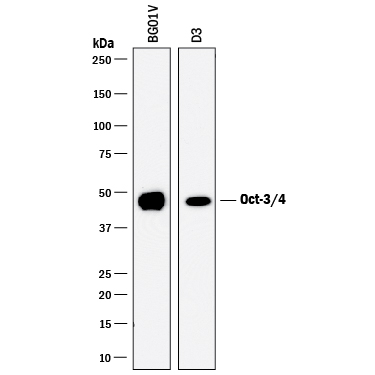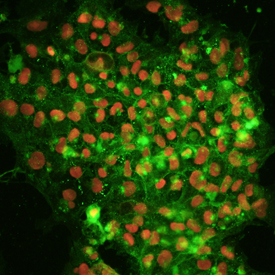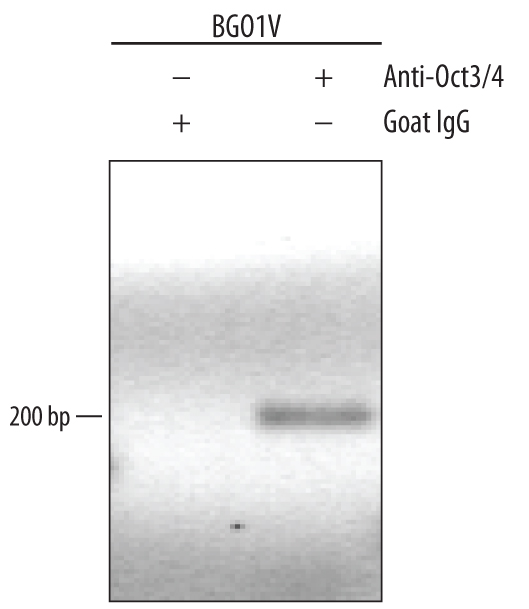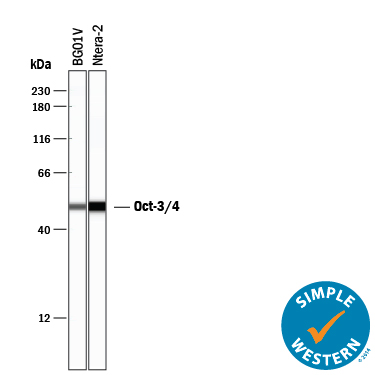Human/Mouse Oct-3/4 Antibody Summary
Met1-Asn265 (Met262Leu)
Accession # Q01860
Applications
Please Note: Optimal dilutions should be determined by each laboratory for each application. General Protocols are available in the Technical Information section on our website.
Scientific Data
 View Larger
View Larger
Detection of Human and Mouse Oct‑3/4 by Western Blot. Western blot shows lysates of BG01V human embryonic stem cells and D3 mouse embryonic stem cell line. PVDF membrane was probed with 0.5 µg/mL of Goat Anti-Human/Mouse Oct-3/4 Antigen Affinity-purified Polyclonal Antibody (Catalog # AF1759) followed by HRP-conjugated Anti-Goat IgG Secondary Antibody (Catalog # HAF017). A specific band was detected for Oct-3/4 at approximately 48 kDa (as indicated). This experiment was conducted under reducing conditions and using Immunoblot Buffer Group 1.
 View Larger
View Larger
Alkaline Phosphatase and Oct‑3/4 in BG01V Human Stem Cells. Alkaline phosphatase (ALPL) and Oct-3/4 were detected in human BG01V embryonic stem cells using 10 µg/mL Human/Mouse/Rat ALPL Monoclonal Antibody (Catalog # MAB1448) and 10 µg/mL Goat Anti-Human/Mouse Oct-3/4 Antigen Affinity-purified Polyclonal Antibody (Catalog # AF1759). Cells were incubated with primary antibodies for 3 hours at room temperature. Cells were stained for ALPL using the NorthernLights™ 557-conjugated Anti-Mouse IgG Secondary Antibody (pseudo-stained green; Catalog # NL007), and stained for Oct-3/4 using the NorthernLights 637-conjugated Anti-Goat IgG Secondary Antibody (red; Catalog # NL002). View our protocol for Fluorescent ICC Staining of Cells on Coverslips.
 View Larger
View Larger
Detection of Oct‑3/4-regulated Genes by Chromatin Immunoprecipitation. BG01V human embryonic stem cells were fixed using formaldehyde, resuspended in lysis buffer, and sonicated to shear chromatin. Oct-3/4/DNA complexes were immunoprecipitated using 5 µg Goat Anti-Human/Mouse Oct-3/4 Antigen Affinity-purified Polyclonal Antibody (Catalog # AF1759) or control antibody (Catalog # AB-108-C) for 15 minutes in an ultrasonic bath, followed by Biotinylated Anti-Goat IgG Secondary Antibody (Catalog # BAF109). Immunocomplexes were captured using 50 µL of MagCellect Streptavidin Ferrofluid (Catalog # MAG999) and DNA was purified using chelating resin solution. Thenanogpromoter was detected by standard PCR.
 View Larger
View Larger
Detection of Human Oct‑3/4 by Simple WesternTM. Simple Western lane view shows lysates of BG01V human embryonic stem cells and NTera-2 human testicular embryonic carcinoma cell line, loaded at 0.2 mg/mL. A specific band was detected for Oct-3/4 at approximately 50 kDa (as indicated) using 20 µg/mL of Goat Anti-Human/Mouse Oct-3/4 Antigen Affinity-purified Polyclonal Antibody (Catalog # AF1759) followed by 1:50 dilution of HRP-conjugated Anti-Goat IgG Secondary Antibody (Catalog # HAF109). This experiment was conducted under reducing conditions and using the 12-230 kDa separation system.
Reconstitution Calculator
Preparation and Storage
- 12 months from date of receipt, -20 to -70 °C as supplied.
- 1 month, 2 to 8 °C under sterile conditions after reconstitution.
- 6 months, -20 to -70 °C under sterile conditions after reconstitution.
Background: Oct-3/4
Oct-3/4, a member of POU transcription factors, was identified as a DNA-binding protein that activates gene transcription via a cis-element containing an octamer motif (1). It is expressed in totipotent embryonic stem and germ cells (2, 3). A critical amount of Oct-3/4 expressed is required to sustain stem cell self-renewal and pluripotency (4). When embryonic stem cells are induced to differentiate, Oct-3/4 is downregulated and this downregulation of Oct-3/4 has proven to be essential for proper and divergent developmental program (5). The Oct-3/4 molecule is not only a master regulator of pluripotency that controls the lineage commitment but also is the most recognized marker used for the identification of totipotent embryonic stem cells.
- Scholer, H.R. et al. (1990) Nature 344:435.
- Scholer, H.R. et al. (1989) EMBO J. 8:2543.
- Rosner, M.H. et al. (1990) Nature 345:686.
- Niwa, H. et al. (2000) Nat. Genet. 24:372.
- Pesce, M. et al. (2001) Stem Cells 19:271.
Product Datasheets
Citations for Human/Mouse Oct-3/4 Antibody
R&D Systems personnel manually curate a database that contains references using R&D Systems products. The data collected includes not only links to publications in PubMed, but also provides information about sample types, species, and experimental conditions.
40
Citations: Showing 1 - 10
Filter your results:
Filter by:
-
Self-organization of embryonic stem cells into a reproducible embryo model through epigenome editing
Authors: Lodewijk, GA;Kozuki, S;Han, C;Topacio, BR;Zargari, A;Lee, S;Knight, G;Ashton, R;Qi, LS;Shariati, SA;
bioRxiv : the preprint server for biology
Species: Human hepegivirus
Sample Types: Whole Cells
Applications: Immunocytochemistry -
Generation of three induced Pluripotent Stem Cell lines from individuals with Hypomyelination with Atrophy of Basal Ganglia and Cerebellum caused by a c.745G>A (p.D249N) autosomal dominant mutation in TUBB4A
Authors: AA Almad, L Garcia, A Takanohash, A Gagne, W Yang, J Ann McGuir, D French, A Vanderver
Stem Cell Research, 2023-03-26;69(0):103083.
Species: Human
Sample Types: Whole Cells
Applications: Flow Cytometry, ICC -
Niche stiffness sustains cancer stemness via TAZ and NANOG phase separation
Authors: X Liu, Y Ye, L Zhu, X Xiao, B Zhou, Y Gu, H Si, H Liang, M Liu, J Li, Q Jiang, J Li, S Yu, R Ma, S Su, JY Liao, Q Zhao
Nature Communications, 2023-01-16;14(1):238.
Species: Human, Mouse
Sample Types: Whole Tissue
Applications: IHC -
ZFP462 safeguards neural lineage specification by targeting G9A/GLP-mediated heterochromatin to silence enhancers
Authors: R Yelagandul, K Stecher, M Novatchkov, L Michetti, G Michlits, J Wang, P Hofbauer, G Vainorius, C Pribitzer, L Isbel, S Mendjan, D Schübeler, U Elling, J Brennecke, O Bell
Nature Cell Biology, 2023-01-05;0(0):.
Species: Mouse
Sample Types: Chromatin
Applications: ChIP -
Establishment of a human induced pluripotent stem cell line (TAUi008-A) derived from a multiple sclerosis patient
Authors: J Lotila, T Hyvärinen, H Skottman, L Airas, S Narkilahti, S Hagman
Oncogene, 2022-07-11;63(0):102865.
Species: Human
Sample Types: Whole Cells
Applications: Flow Cytometry, ICC -
In�vitro attachment and symmetry breaking of a human embryo model assembled from primed embryonic stem cells
Authors: M Simunovic, ED Siggia, AH Brivanlou
Cell Stem Cell, 2022-06-02;29(6):962-972.e4.
Species: Human
Sample Types: Whole Tissue
Applications: IHC -
Oct4 differentially regulates chromatin opening and enhancer transcription in pluripotent stem cells
Authors: L Xiong, EA Tolen, J Choi, S Velychko, L Caizzi, T Velychko, K Adachi, CM MacCarthy, M Lidschreib, P Cramer, HR Schöler
Elife, 2022-05-27;11(0):.
Species: Mouse
Sample Types: Cell Lysates
Applications: ChIP -
Inability to switch from ARID1A-BAF to ARID1B-BAF impairs exit from pluripotency and commitment towards neural crest formation in ARID1B-related neurodevelopmental disorders
Authors: L Pagliaroli, P Porazzi, AT Curtis, C Scopa, HMM Mikkers, C Freund, L Daxinger, S Deliard, SA Welsh, S Offley, CA Ott, B Calabretta, SA Brugmann, GWE Santen, M Trizzino
Nature Communications, 2021-11-09;12(1):6469.
Species: Human
Sample Types: Whole Cells
Applications: ICC -
Human iPSC lines from a Christianson syndrome patient with NHE6 W523X mutation, a biologically-related control, and CRISPR/Cas9 gene-corrected isogenic controls
Authors: L Ma, M Schmidt, EM Morrow
Stem Cell Research, 2021-06-18;54(0):102435.
Species: Human
Sample Types: Whole Cells
Applications: ICC -
Neural differentiation medium for human pluripotent stem cells to model physiological glucose levels in human brain
Authors: ME Mor, A Harvey, M Familari, M St Clair-G, S Viventi, RU de Iongh, FJ Cameron, M Dottori
Brain research bulletin, 2021-05-19;173(0):141-149.
Species: Human
Sample Types: Whole Cells
Applications: ICC -
Comparative evaluation of isogenic mesodermal and ectomesodermal chondrocytes from human iPSCs for cartilage regeneration
Authors: MS Lee, MJ Stebbins, H Jiao, HC Huang, EM Leiferman, BE Walczak, SP Palecek, EV Shusta, WJ Li
Science Advances, 2021-05-19;7(21):.
Species: Human
Sample Types: Whole Cells
Applications: Flow Cytometry -
Directed Differentiation of Human Pluripotent Stem Cells towards Corneal Endothelial-Like Cells under Defined Conditions
Authors: P Grönroos, T Ilmarinen, H Skottman
Cells, 2021-02-05;10(2):.
Species: Human
Sample Types: Whole Cells
Applications: ICC -
Induced organoids derived from patients with ulcerative colitis recapitulate colitic reactivity
Authors: SK Sarvestani, S Signs, B Hu, Y Yeu, H Feng, Y Ni, DR Hill, RC Fisher, S Ferrandon, RK DeHaan, J Stiene, M Cruise, TH Hwang, X Shen, JR Spence, EH Huang
Nature Communications, 2021-01-11;12(1):262.
Species: Human
Sample Types: Whole Cells
Applications: ICC -
WAPL maintains a cohesin loading cycle to preserve cell-type-specific distal gene regulation
Authors: NQ Liu, M Maresca, T van den Br, L Braccioli, MMGA Schijns, H Teunissen, BG Bruneau, EP Nora, E de Wit
Nature Genetics, 2020-12-14;0(0):.
Species: Human
Sample Types: Cell Lysates
Applications: ChIP -
A multiplexed gRNA piggyBac transposon system facilitates efficient induction of CRISPRi and CRISPRa in human pluripotent stem cells
Authors: DZ Hazelbaker, A Beccard, G Angelini, P Mazzucato, A Messana, D Lam, K Eggan, LE Barrett
Sci Rep, 2020-01-20;10(1):635.
Species: Human
Sample Types: Whole Cells
Applications: ICC -
Functional characterization of human pluripotent stem cell-derived cortical networks differentiated on laminin-521 substrate: comparison to rat cortical cultures
Authors: T Hyvärinen, A Hyysalo, FE Kapucu, L Aarnos, A Vinogradov, SJ Eglen, L Ylä-Outine, S Narkilahti
Sci Rep, 2019-11-20;9(1):17125.
Species: Rat
Sample Types: Whole Cells
Applications: ICC -
Human mid-trimester amniotic fluid (stem) cells lack expression of the pluripotency marker OCT4A
Authors: F Vlahova, KE Hawkins, AM Ranzoni, KL Hau, R Sagar, P Coppi, AL David, J Adjaye, PV Guillot
Sci Rep, 2019-05-31;9(1):8126.
Species: Human
Sample Types: Whole Cells
Applications: Flow Cytometry, ICC -
SOX2 and SOX9 are markers of clinically aggressive disease in metastatic high-grade serous carcinoma
Authors: M Sherman-Sa, H Onallah, A Holth, R Reich, B Davidson
Gynecol. Oncol., 2019-03-21;0(0):.
Species: Human
Sample Types: Whole Tissue
Applications: IHC -
O-GlcNAc transferase activates stem-like cell potential in hepatocarcinoma through O-GlcNAcylation of eukaryotic initiation factor 4E
Authors: B Cao, M Duan, Y Xing, C Liu, F Yang, Y Li, T Yang, Y Wei, Q Gao, J Jiang
J. Cell. Mol. Med., 2019-01-24;0(0):.
Species: Human
Sample Types: Cell Lysates
Applications: Western Blot -
The BAF and PRC2 Complex Subunits Dpf2 and Eed Antagonistically Converge on Tbx3 to Control ESC Differentiation
Authors: W Zhang, C Chronis, X Chen, H Zhang, R Spalinskas, M Pardo, L Chen, G Wu, Z Zhu, Y Yu, L Yu, J Choudhary, J Nichols, MM Parast, B Greber, P Sahlén, K Plath
Cell Stem Cell, 2019-01-03;24(1):138-152.e8.
Species: Mouse
Sample Types: Cell Lysates
Applications: Western Blot -
Small non-coding RNA landscape of extracellular vesicles from human stem cells
Authors: S Kaur, AG Abu-Shahba, RO Paananen, H Hongisto, H Hiidenmaa, H Skottman, R Seppänen-K, B Mannerströ
Sci Rep, 2018-10-19;8(1):15503.
Species: Human
Sample Types: Whole Cells
Applications: Differentiation, Differentiation -
Disrupted alternative splicing for genes implicated in splicing and ciliogenesis causes PRPF31 retinitis pigmentosa
Authors: A Buskin, L Zhu, V Chichagova, B Basu, S Mozaffari-, D Dolan, A Droop, J Collin, R Bronstein, S Mehrotra, M Farkas, G Hilgen, K White, KT Pan, A Treumann, D Hallam, K Bialas, G Chung, C Mellough, Y Ding, N Krasnogor, S Przyborski, S Zwolinski, J Al-Aama, S Alharthi, Y Xu, G Wheway, K Szymanska, M McKibbin, CF Inglehearn, DJ Elliott, S Lindsay, RR Ali, DH Steel, L Armstrong, E Sernagor, H Urlaub, E Pierce, R Lührmann, SN Grellschei, CA Johnson, M Lako
Nat Commun, 2018-10-12;9(1):4234.
Species: Human
Sample Types: Whole Cells
Applications: ICC -
Generation of nine induced pluripotent stem cell lines as an ethnic diversity panel
Authors: X Gao, JJ Yourick, RL Sprando
Stem Cell Res, 2018-07-27;31(0):193-196.
Species: Human
Sample Types: Whole Cells
Applications: ICC -
Dinaciclib potently suppresses MCL-1 and selectively induces the cell death in human iPS cells without affecting the viability of cardiac tissue
Authors: K Alsayegh, K Matsuura, H Sekine, T Shimizu
Sci Rep, 2017-03-31;7(0):45577.
Species: Human
Sample Types: Whole Cells
Applications: ICC -
Brain tissue banking for stem cells for our future
Sci Rep, 2016-12-19;6(0):39394.
Species: Human
Sample Types: Tissue Homogenates
Applications: IHC -
Generation of a TLE1 homozygous knockout human embryonic stem cell line using CRISPR-Cas9
Stem Cell Res, 2016-09-16;17(2):430-432.
Species: Human
Sample Types: Whole Cells
Applications: IHC-Fr -
Generation of a TLE3 heterozygous knockout human embryonic stem cell line using CRISPR-Cas9
Stem Cell Res, 2016-09-15;17(2):441-443.
Species: Human
Sample Types: Whole Cells
Applications: IHC-Fr -
Semaphorin 3A induces mesenchymal-stem-like properties in human periodontal ligament cells.
Authors: Wada, Naohisa, Maeda, Hidefumi, Hasegawa, Daigaku, Gronthos, Stan, Bartold, Peter Ma, Menicanin, Danijela, Fujii, Shinsuke, Yoshida, Shinichi, Tomokiyo, Atsushi, Monnouchi, Satoshi, Akamine, Akifumi
Stem Cells Dev, 2014-02-10;23(18):2225-36.
Species: Human
Sample Types: Whole Cells
Applications: ICC -
Effects of antioxidants on the quality and genomic stability of induced pluripotent stem cells.
Authors: Luo, Lan, Kawakatsu, Miho, Guo, Chao-Wan, Urata, Yoshishi, Huang, Wen-Jing, Ali, Haytham, Doi, Hanako, Kitajima, Yuriko, Tanaka, Takayuki, Goto, Shinji, Ono, Yusuke, Xin, Hong-Bo, Hamano, Kimikazu, Li, Tao-Shen
Sci Rep, 2014-01-21;4(0):3779.
Species: Human
Sample Types: Cell Lysates, Whole Cells
Applications: ICC, Western Blot -
Pluripotent stem cells derived from mouse and human white mature adipocytes.
Authors: Jumabay M, Abdmaulen R, Ly A, Cubberly M, Shahmirian L, Heydarkhan-Hagvall S, Dumesic D, Yao Y, Bostrom K
Stem Cells Transl Med, 2014-01-06;3(2):161-71.
Species: Mouse
Sample Types: Whole Cells
Applications: ICC -
Genome-wide chromatin interactions of the Nanog locus in pluripotency, differentiation, and reprogramming.
Authors: Apostolou E, Ferrari F, Walsh R, Bar-Nur O, Stadtfeld M, Cheloufi S, Stuart H, Polo J, Ohsumi T, Borowsky M, Kharchenko P, Park P, Hochedlinger K
Cell Stem Cell, 2013-05-09;12(6):699-712.
Species: Mouse
Sample Types: Cell Lysates
Applications: ChIP, Co-Immunoprecipitation -
Generation of corneal epithelial cells from induced pluripotent stem cells derived from human dermal fibroblast and corneal limbal epithelium.
Authors: Hayashi, Ryuhei, Ishikawa, Yuki, Ito, Miyuki, Kageyama, Tomofumi, Takashiba, Kuniko, Fujioka, Tsuyoshi, Tsujikawa, Motokazu, Miyoshi, Hiroyuki, Yamato, Masayuki, Nakamura, Yukio, Nishida, Kohji
PLoS ONE, 2012-09-24;7(9):e45435.
Species: Human
Sample Types: Whole Cells
Applications: ICC -
A novel role for an RNA polymerase III subunit POLR3G in regulating pluripotency in human embryonic stem cells.
Authors: Wong RC, Pollan S, Fong H, Ibrahim A, Smith EL, Ho M, Laslett AL, Donovan PJ
Stem Cells, 2011-10-01;29(10):1517-27.
Species: Human
Sample Types: Cell Lysates
Applications: ChIP -
Glial cell line-derived neurotrophic factor and endothelial cells promote self-renewal of rabbit germ cells with spermatogonial stem cell properties.
Authors: Kubota H, Wu X, Goodyear SM, Avarbock MR, Brinster RL
FASEB J., 2011-04-27;25(0):2604-14.
Species: Rabbit
Sample Types: Whole Cells
Applications: ICC -
SIP1 mediates cell-fate decisions between neuroectoderm and mesendoderm in human pluripotent stem cells.
Authors: Chng Z, Teo A, Pedersen RA, Vallier L
Cell Stem Cell, 2010-01-08;6(1):59-70.
Species: Human
Sample Types: Cell Lysates
Applications: ChIP -
Regulation of self-renewal and pluripotency by Sox2 in human embryonic stem cells.
Authors: Fong H, Hohenstein KA, Donovan PJ
Stem Cells, 2008-04-03;26(8):1931-8.
Species: Human
Sample Types: Whole Cells
Applications: ICC -
Differential requirements for hematopoietic commitment between human and rhesus embryonic stem cells.
Authors: Rajesh</LastName><ForeNam D</Initial, Rajesh D, Chinnasamy N, Mitalipov SM, Wolf DP, Slukvin I, Thomson JA, Shaaban AF
Stem Cells, 2007-02-01;25(2):490-9.
Species: Human, Primate - Macaca mulatta (Rhesus Macaque)
Sample Types: Whole Cells
Applications: Flow Cytometry -
A comparison of NIH-approved human ESC lines.
Authors: Ware CB, Nelson AM, Blau CA
Stem Cells, 2006-08-17;24(12):2677-84.
Species: Human
Sample Types: Whole Cells
Applications: ICC -
Controlled-rate freezing of human ES cells.
Authors: Ware CB, Nelson AM, Blau CA
BioTechniques, 2005-06-01;38(6):879-80, 882-3.
Species: Human
Sample Types: Whole Cells
Applications: ICC
FAQs
No product specific FAQs exist for this product, however you may
View all Antibody FAQsReviews for Human/Mouse Oct-3/4 Antibody
Average Rating: 4.5 (Based on 2 Reviews)
Have you used Human/Mouse Oct-3/4 Antibody?
Submit a review and receive an Amazon gift card.
$25/€18/£15/$25CAN/¥75 Yuan/¥2500 Yen for a review with an image
$10/€7/£6/$10 CAD/¥70 Yuan/¥1110 Yen for a review without an image
Filter by:
Cells: human induced pluripotent stem cells
Primary antibody: Goat anti-human OCT3/4 (1:200), O/N incubation at 4 degrees
Secondary antibody: anti-goat AF568




